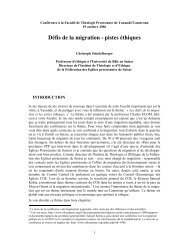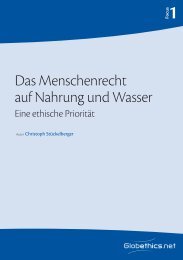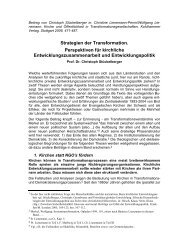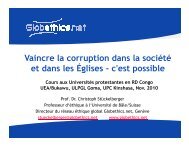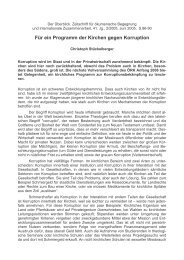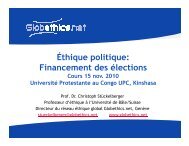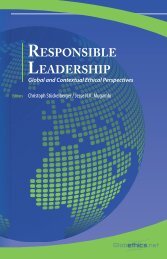BREAK THE CHAINS OF OPPRESION AND THE YOKE OF ...
BREAK THE CHAINS OF OPPRESION AND THE YOKE OF ...
BREAK THE CHAINS OF OPPRESION AND THE YOKE OF ...
Create successful ePaper yourself
Turn your PDF publications into a flip-book with our unique Google optimized e-Paper software.
DEMoc rAcy Naturally, in many cases this cooperation is fragmentary and those in power in<br />
these organisations greatly influence the politics of the organisations. But the<br />
fact that it has, for example, finally proved possible to put the issue of a (further<br />
developed) of Financial Transaction Tax (FTT) on the agenda of the IMF – a<br />
great success for the emancipatory forces in civil societies that have been pursuing<br />
this and spreading information about it for years. 16<br />
Sometimes, experience teaches, international organisations do move after all!<br />
For, the more international organisations impinge on the freedoms of individuals,<br />
the sooner questions on their legitimacy arises. International organisations<br />
may, for example, see themselves as the champions of peace, freedom and welfare.<br />
With an high intention for good governance but in the absence of democratic<br />
procedures like those in the traditional nation state they are worse controlled<br />
when they exercise power than democratic states under the rule of law.<br />
The UN Security Council published a list of suspected terrorists who are prohibited<br />
from using any of their assets. However he UN does not provide any control<br />
through courts.<br />
The constitutionalisation of the Law of Nations is most certainly the goal to<br />
strive for and it is absolutely necessary. The individual should be defined as being<br />
the subject of the Law of Nations, structures of legitimation should be created –<br />
for example, at the level of the UN – and the development of a common concept<br />
of public welfare is absolutely necessary. These latter three are the basic preconditions<br />
if we are to give a “constitutional character” 17 to the Law of Nations.<br />
However, constitutionalisation is not yet democratization. When individual personal<br />
rights are codified under the Law of Nations, and the actions of governments<br />
are increasingly bound to rules which hold good even when it goes against<br />
the will of a government, � �this means � that democratic � �politics<br />
will be made possible<br />
for the first time.<br />
Hence, we are not standing here at the beginning; strictly speaking we are a step<br />
ahead of it.<br />
16 According to IMF director Dominique Strauss-Kahn, the IMF will look into the issue<br />
of a Financial Transaction Tax (FTT). In a speech in London on 23 November 2009<br />
he said:<br />
16 "... we have been asked by the G-20 to look into financial sector taxes. This is an interes ting<br />
issue. Can the tax system help reduce excessive risk-taking in the financial sector? Can it be<br />
used to further the legitimate goals of fairness and equity in this area? There are a number of<br />
ways to think about this, and we will look at it from various angles and consider all propo -<br />
sals. Let me say that the financial sector should contribute to the cost of the rescue and to<br />
limi ting recourse to public financing in the event of a future crisis. I suggest this for practical<br />
reasons because, in my view, there would not be political support in parliaments for a rescue<br />
on the scale we have seen during this crisis." (Online: http://www.imf.org/external/<br />
np/speeches/2009/112309.htm. Accessed on Sept. 2009.)<br />
17 Christoph Möller, Der vermisste Leviathan, Frankfurt, Suhrkamp, 2008, p. 109.<br />
������������������������������������������������<br />
� � � � � ���������������������� �<br />
48<br />
– DEMOCRACY – A MATTER <strong>OF</strong> CHOICE!? –



